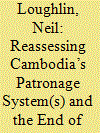| Srl | Item |
| 1 |
ID:
190041


|
|
|
|
|
| Summary/Abstract |
The year 2022 began with a newly anointed leader-in-waiting in Hun Manet, the eldest son of prime minister Hun Sen. This formalized a process of hereditary succession underway for several years. Notwithstanding the prospect of change at the top, the authoritarian modus operandi of Cambodian politics continued in much the same way as in previous years, with government harassment of the opposition, a series of politically motivated court cases, and repression of civil society. Cambodia managed a relatively uneventful year as chair of ASEAN, but its international reputation was badly tarnished when its centrality to a surge in international criminal scamming operations and associated trafficking in persons shone a light on the corrupted nature of the country’s political economy. The economy began to recover from the effects of COVID-19, due in part to investment from China, but the consequences of the pandemic continued to be felt, particularly among poorer citizens.
|
|
|
|
|
|
|
|
|
|
|
|
|
|
|
|
| 2 |
ID:
173687


|
|
|
|
|
| Summary/Abstract |
The dominant literature on Cambodian politics over the past two decades suggested that a mixture of elite and mass clientelism had enabled the hegemonic Cambodian People’s Party (CPP) to rule via competitive but authoritarian elections, while lessening its previous reliance on repression and violence. Such explanations did not predict the upswing in contestation in the country in 2013 and thereafter. Neither do they account for the crackdown that followed. Following literature that draws attention to the tensions in building and maintaining political coalitions under authoritarianism, and demonstrating the difficulties in maintaining competitive authoritarianism over time, this article draws attention to structural, institutional, and distributional impediments to the CPP leadership in building and maintaining effective reciprocal relations with electoral clients while simultaneously balancing the interests of the military and other elites at the core of the regime. To make its argument, the article compares weaknesses in the CPP’s electoral clientelism with the effectiveness of patronage within the security forces, seen through the lens of Cambodia’s experience of land dispossession. It shows that an extractive and exclusive political economy privileged the interests of regime insiders over potential mass electoral clients precisely during the same period the CPP was supposed to be securing its hold on power via mass electoral clientelism. This further explains why the regime fell back on repression over reform in response to the upswing in contestation manifest from 2013, and why, despite the failings of its mass patronage project, repression has nevertheless been successful as a strategy for regime survival during a period of heightened popular contestation.
|
|
|
|
|
|
|
|
|
|
|
|
|
|
|
|